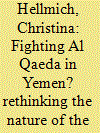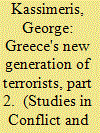| Srl | Item |
| 1 |
ID:
115009


|
|
|
|
|
| Publication |
2012.
|
| Summary/Abstract |
The notion of "counterinsurgency" (COIN) has for some years been the central concept driving military operations in Afghanistan, and before that, in Iraq. It constitutes the dominant idea influencing much current military planning of the major Western powers. This study questions the assumptions and relevance of the thinking behind counterinsurgency doctrine. It suggests that the ultimate effect of its dominance is to reduce the highly contingent nature of war to a list of techniques, the application of which are regarded as a sufficient precondition whenever states deem that they are confronted by conflicts that can be described as an "insurgency." Such assumptions are both arbitrary and risk crowding out necessary, although by their nature very difficult, political judgments that are required for the effective construction and implementation of strategies that seek to ensure that the ends sought are proportional to the means employed.
|
|
|
|
|
|
|
|
|
|
|
|
|
|
|
|
| 2 |
ID:
115010


|
|
|
|
|
| Publication |
2012.
|
| Summary/Abstract |
This article evaluates U.S. perception of and response to Al Qaeda in the Arabian Peninsula (AQAP) operating in Yemen. It evaluates the empirical evidence on which the present understanding of the group is based, the implications of the sociopolitical context in which it operates, and the uneasy position of the Yemeni government in the War against Terror as it has been affected by U.S. policy from the early 1990s to the present. In the contested Yemeni state, AQAP is competing for political legitimacy and is increasingly dependent on public support. The U.S. kill-or-capture response, the "on-off" nature of its support that has made Yemen vulnerable to the influence of Al Qaeda in the past, and the actions of the Yemeni government itself, which depends on the continued existence of the threat to secure financial support vital for political survival, means that none of the measures being taken has the potential to defeat AQAP.
|
|
|
|
|
|
|
|
|
|
|
|
|
|
|
|
| 3 |
ID:
115011


|
|
|
|
|
| Publication |
2012.
|
| Summary/Abstract |
On 2 November 2010, the Greek government took the unprecedented step of suspending international airmail for 48 hours after a wave of parcel bombs targeting the German Chancellor, Angela Merkel, the Italian premier Silvio Berlusconi, and the French President Nicholas Sarkozy as well as a number of foreign embassies in Greece and across Europe caused a major security scare. Responsibility for the parcel bombs campaign, which placed European counterterrorism authorities on high alert, was claimed by the Greek anarchist-oriented guerrilla group, Conspiracy of Cells of Fire (CCF). Since its emergence in 2008, CCF has become one of the most active of Greece's new generation of urban guerrilla groups. This article examines CCF's campaign of violence and explains its selection of targets and the nature of its organizational and operational development.
|
|
|
|
|
|
|
|
|
|
|
|
|
|
|
|
| 4 |
ID:
115012


|
|
|
|
|
| Publication |
2012.
|
| Summary/Abstract |
This article examines the impact of the spreading of Wahhabism (as one of the most militant religious teachings) on the escalation of international terrorism on European soil. It tries to point out potential hazards and propose possible measures to protect Western Europe from further penetration of this conservative Islamic movement through the Balkans. In order to elaborate the stated interdependency, this article includes our analysis of the phenomenon and spreading of Wahhabism throughout the Balkans, more concretely-on the territories of the Republic of Serbia, Montenegro, as well as Bosnia and Herzegovina. This is precisely the region where Wahhabism has made its first step to "conquer" Europe.
|
|
|
|
|
|
|
|
|
|
|
|
|
|
|
|